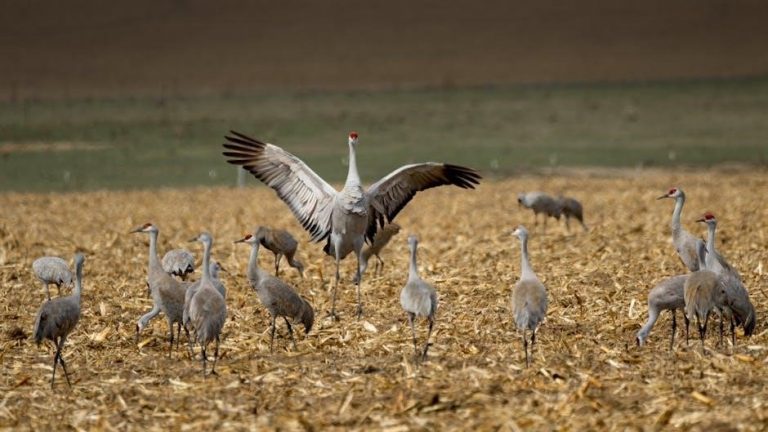
Washington State waterfowl guides offer expert-led experiences for hunters and birdwatchers, showcasing the region’s diverse wetlands and coastal areas. With a rich history dating back to the early 20th century, these guides provide unparalleled insights into waterfowl ecology, migration patterns, and habitat preservation. Their deep knowledge ensures safe, ethical, and memorable expeditions, catering to both novice and seasoned enthusiasts.
Importance of Waterfowl Guides in Washington State
Waterfowl guides in Washington State play a vital role in promoting safe, ethical, and sustainable outdoor experiences. They ensure adherence to regulations, protecting both wildlife and habitats, while fostering responsible hunting and birdwatching practices. Guides provide expertise on species behavior, migration patterns, and habitat preservation, enhancing the overall experience for participants. Their knowledge helps maintain the balance between recreational activities and conservation efforts, supporting the state’s rich waterfowl heritage. Additionally, they contribute to environmental stewardship by educating visitors about the importance of preserving ecosystems for future generations.
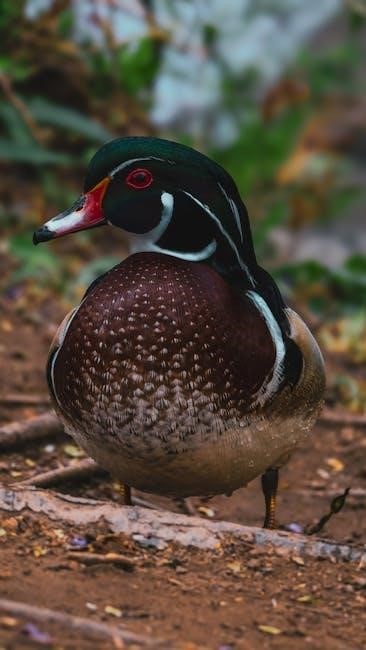
History of Waterfowl Activities in Washington State
Waterfowl activities in Washington State trace back to early colonial times, with abundant species attracting settlers and hunters. The region’s wetlands and coastal areas became vital for hunting and conservation, shaping a rich tradition that continues today.
Evolution of Waterfowl Hunting and Bird Watching
Waterfowl hunting in Washington State has evolved from early subsistence practices to regulated recreational activities, with conservation efforts shaping modern practices. Bird watching emerged as a complementary pursuit, driven by the state’s diverse migratory species. Historical records show waterfowl populations fluctuating due to habitat changes and hunting pressures. Today, both hunting and birding coexist, supported by sustainable practices and eco-tourism initiatives. Guides now emphasize ethical conduct, wildlife preservation, and educational experiences, fostering a deeper appreciation for avian life and their habitats. This dual focus ensures the longevity of these traditions for future generations.
Regulations and Licensing for Waterfowl Activities
Waterfowl activities in Washington State require specific licenses and permits, ensuring sustainable practices. Hunters must obtain state and federal waterfowl stamps, with age and residency affecting requirements. Guides often assist participants in navigating these regulations, which include training programs like the Master Hunter certification. Conservation efforts, such as permits for species like Harlequin ducks, are strictly enforced. Bag limits and season dates are carefully managed to protect populations. These regulations ensure ethical and responsible engagement with wildlife, balancing recreational pursuits with environmental preservation.
Licensing Requirements for Guides and Participants
Guides and participants in Washington State waterfowl activities must adhere to strict licensing requirements. Guides are required to hold a Master Hunter certification, ensuring expertise in ethical hunting practices. Participants must obtain a valid hunting license and federal waterfowl stamp. Additional permits may be needed for specific species, such as Harlequin ducks. Background checks and first aid training are mandatory for guides. These regulations ensure safe, responsible, and legal engagement with wildlife. Compliance with licensing requirements helps preserve waterfowl populations and maintains sustainable ecosystems for future generations.
Species of Waterfowl in Washington State
Washington State is home to a diverse range of waterfowl species, including ducks, geese, and swans. Native species thrive alongside migratory birds, creating a vibrant ecosystem.
Native vs. Migratory Waterfowl Species
Washington State hosts a mix of native and migratory waterfowl species. Native species, such as the Wood Duck and Harlequin Duck, reside year-round, adapting to local habitats. Migratory species, like the Northern Pintail and Snow Goose, pass through seasonally, relying on wetlands for refuge. These birds often travel thousands of miles, making the state a critical stopover. Guides emphasize the importance of understanding these species’ behaviors and habitats to ensure ethical and sustainable interactions. This balance between native and migratory populations highlights the state’s role in global waterfowl conservation efforts.
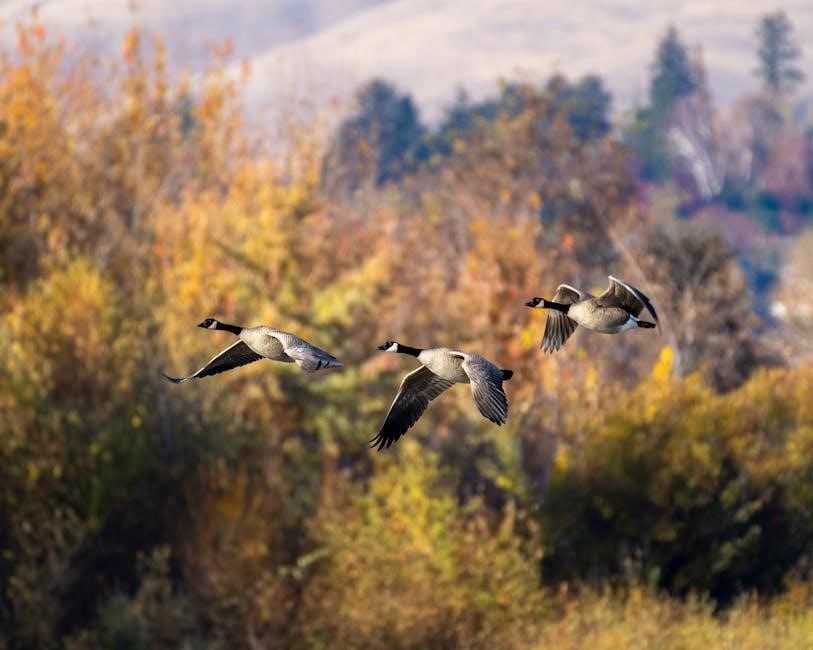
Guides and Outfitters in Washington State
Experienced professionals, Washington State waterfowl guides and outfitters offer specialized hunting and birdwatching tours, ensuring safe and memorable expeditions. Their deep knowledge of local habitats and migration patterns enhances the experience for enthusiasts.
Choosing the Right Waterfowl Guide or Outfitter
Selecting a reputable waterfowl guide or outfitter in Washington State ensures a safe and rewarding experience. Look for professionals with extensive local knowledge and proven expertise in waterfowl ecology. Verify certifications, licenses, and reviews to assess reliability and ethical practices. Ensure they offer tailored experiences, whether for hunting or birdwatching, and prioritize safety and environmental stewardship. Their familiarity with migration patterns, habitats, and seasonal changes will enhance your adventure. A good guide balances fun with conservation, making them invaluable for both novices and seasoned enthusiasts seeking unforgettable waterfowl experiences in Washington’s diverse landscapes.
Conservation Efforts and Habitat Preservation
Washington State prioritizes waterfowl habitat preservation through wetland restoration and wildlife management programs. Conservation initiatives address declining species and migration challenges, ensuring sustainable ecosystems for future generations.
Role of Guides in Conservation Initiatives
Waterfowl guides play a crucial role in conservation by promoting sustainable practices and educating participants about habitat preservation. They collaborate with wildlife experts to monitor species health and migration patterns, ensuring ethical hunting and viewing practices. Guides often support initiatives like wetland restoration and nesting site protection, fostering biodiversity; Their expertise helps balance recreational activities with environmental stewardship, making them key ambassadors for conservation efforts in Washington State’s delicate ecosystems. By advocating for responsible land use, guides contribute to the long-term survival of waterfowl populations and their habitats.
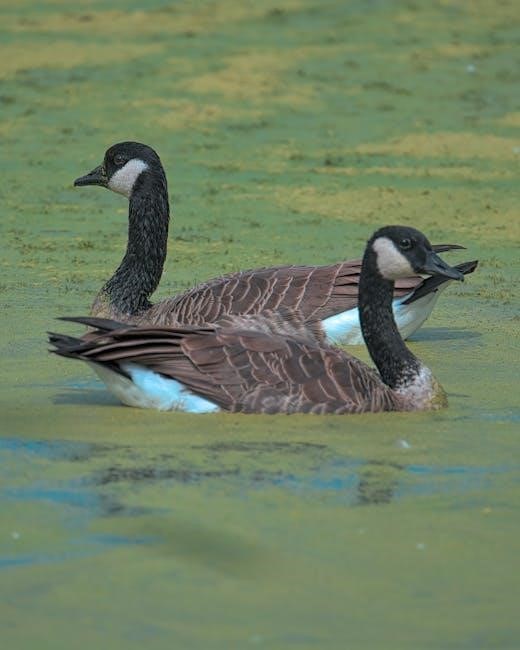
Best Practices for Waterfowl Hunting and Viewing
Adhere to local regulations, practice safe and ethical conduct, and respect wildlife habitats to ensure sustainable waterfowl activities in Washington State’s diverse ecosystems and wetlands.
Ethical Considerations in Waterfowl Activities
Ethical waterfowl hunting and viewing require respect for wildlife, habitats, and fellow enthusiasts. Hunters must follow fair chase principles, minimizing stress on birds and avoiding wasteful practices. Non-toxic shot and proper field dressing ensure humane and sustainable harvesting. Birdwatchers should maintain safe distances to avoid disrupting natural behaviors. Guides emphasize leaving no trace, preserving ecosystems, and promoting coexistence with wildlife. Ethical practices not only conserve waterfowl populations but also foster a positive reputation for outdoor recreation in Washington State, ensuring these activities remain accessible for future generations.
Economic Impact of Waterfowl Tourism
Waterfowl tourism significantly boosts Washington State’s economy, generating revenue through guided tours, lodging, and gear sales, while creating jobs and fostering community growth in rural areas annually.
Contribution of Waterfowl Activities to Local Economies
Waterfowl activities significantly contribute to local economies in Washington State by generating revenue through guided tours, lodging, and equipment sales. These activities create jobs for guides, hospitality workers, and retailers, boosting rural communities. Additionally, waterfowl tourism attracts visitors who spend on local services, supporting small businesses and community projects. The annual influx of hunters and birdwatchers ensures a steady economic flow, particularly in seasonal periods. This sustainable tourism model not only enhances economic growth but also promotes conservation efforts, ensuring the preservation of natural habitats for future generations.
Safety Measures and Guidelines
Washington State waterfowl guides emphasize strict safety protocols, ensuring compliance with regulations and ethical practices to protect participants and wildlife, fostering a secure and responsible outdoor experience.
Ensuring Safe Expeditions in Washington State
Washington State waterfowl guides prioritize safety through rigorous preparation and adherence to regulations. They conduct thorough risk assessments, ensuring participants are well-equipped for varying weather conditions. Guides are certified in first aid and emergency response, with access to reliable communication devices. Environmental awareness is emphasized, with a focus on ethical practices to minimize ecological impact. By fostering a culture of responsibility and respect for nature, these guides ensure safe and enriching experiences for all, while promoting the conservation of waterfowl habitats and wildlife.
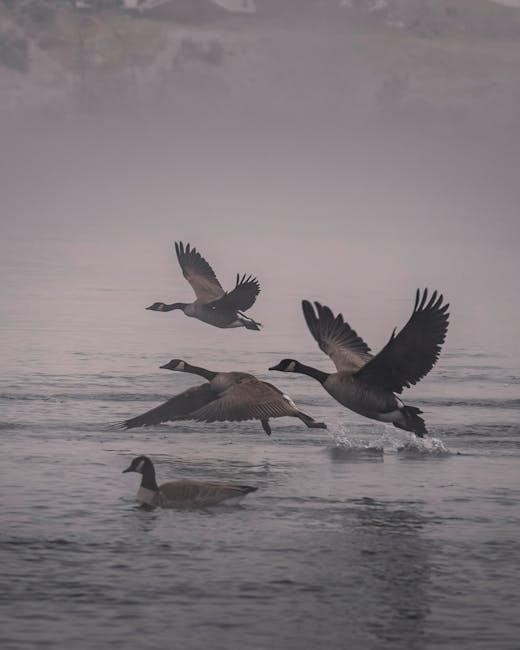
Training and Certification for Waterfowl Guides
Washington State waterfowl guides undergo rigorous training and certification, ensuring expertise in safety protocols, environmental stewardship, and ethical hunting practices to meet state standards effectively.
Becoming a Certified Waterfowl Guide in Washington
Becoming a certified waterfowl guide in Washington requires completing a comprehensive training program, which includes coursework on waterfowl ecology, safety protocols, and legal regulations. Aspiring guides must also demonstrate proficiency in hunting ethics, wildlife conservation, and environmental stewardship. Many programs incorporate mentorship opportunities with experienced guides to ensure hands-on learning. Certification often involves passing a written exam and a field assessment to verify practical skills. This rigorous process ensures that guides are well-equipped to lead safe, ethical, and educational expeditions while contributing to the conservation of Washington’s waterfowl populations and habitats.
Gear and Equipment for Waterfowl Activities
Essential gear includes durable shotguns, high-quality blinds, decoys, and waterproof clothing. Advanced optics and GPS devices enhance navigation and bird tracking in Washington’s diverse wetland environments.
Essential Tools for Successful Waterfowl Expeditions
Essential tools for waterfowl expeditions include high-quality shotguns, durable blinds, and realistic decoys. Waterproof clothing, insulated boots, and thermal layers are crucial for braving cold, wet conditions. Optics like binoculars and scopes enhance bird identification, while GPS devices aid navigation in vast wetlands. Calls and lanyards mimic waterfowl sounds, attracting birds effectively. Ammunition, specifically steel shot, is required for hunting. Sturdy bags and storage containers protect gear, and first-aid kits ensure safety. Portable boats or kayaks facilitate access to remote areas, while motion decoys add realism to spreads. These tools, combined with expertise from guides, maximize success and enjoyment in Washington’s waterfowl-rich environments.
Tourism and Recreation Opportunities
Washington State offers diverse waterfowl-related tourism, blending outdoor adventures with ecological exploration. Birdwatching, hunting, and eco-tourism attract visitors, fostering connections with nature and supporting local economies sustainably.
Combining Waterfowl Activities with Tourism in Washington
Washington State seamlessly blends waterfowl activities with tourism, offering unique outdoor experiences that attract both hunters and birdwatchers. Guided tours provide opportunities to explore diverse ecosystems, fostering a deep connection with nature. Many visitors combine waterfowl hunting or birdwatching with exploring scenic landscapes, cultural sites, and local cuisine, enhancing their travel experience. Eco-tourism initiatives also educate visitors about waterfowl conservation, promoting sustainable practices. This integration supports local economies while preserving natural habitats, making Washington a premier destination for nature enthusiasts seeking adventure and environmental stewardship.
Future Outlook and Challenges
Washington State waterfowl guides face challenges like declining hunting participation and habitat pressures, requiring adaptive management and conservation efforts to ensure sustainable waterfowl populations and activities.
Challenges and Opportunities for Waterfowl Guides
Washington State waterfowl guides face challenges such as declining hunting participation and habitat loss due to urbanization. Climate change also impacts migratory patterns, requiring adaptive strategies. However, opportunities exist in eco-tourism growth, with increasing interest in birdwatching and wildlife photography. Guides can diversify services to include conservation education and habitat restoration efforts. Collaborating with state agencies and environmental groups can enhance their role in sustainability. By embracing innovation and promoting ethical practices, guides can thrive while supporting biodiversity and outdoor recreation. This balance ensures a sustainable future for waterfowl activities in Washington State.
